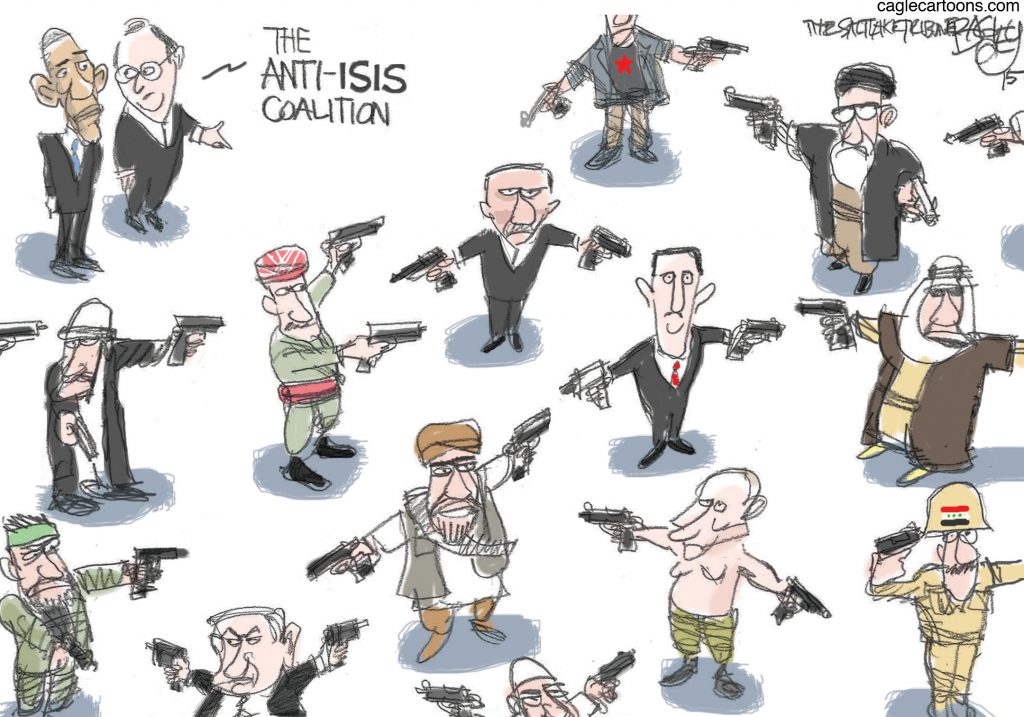Take a look at the Wikipedia page about the military intervention against ISIS. Specifically, focus on the side panel where the belligerents are listed. To the right, you see ISIS and a few allies with similar ideologies, like al-Qaida and the Nusra Front, both of whom have fought with ISIS in the past. To the left, you see a seemingly endless list of nations opposed to ISIS in some form or another. These include non-state actors fighting ISIS directly (Hezbollah, the Kurds) and those bombing ISIS (the United States, Russia and France, among others). Some are participating in Syria and Iraq (Belgium, Denmark and the Netherlands) and others only in Syria (Turkey and Gulf Arab states).
At what point since the waning days of World War II, when numerous countries joined the Allies, has there been a more diverse group working against a common enemy? Of course, as we all know, this Wikipedia view of the conflict belies a much more complex reality. While all these countries may share a similar desire to end ISIS, for most, this is not their end goal.
Syrian President Bashar Assad is fighting for self-preservation. Iran, Hezbollah and Russia are primarily defending Assad as a loyal ally and a means to maintain influence in the region. The U.S. and the Gulf states, whose early support for Assad’s opponents contributed to the rise of ISIS, are now fighting to contain this contagion. The Kurds are fighting first in self-defense and second with the goal of an independent Kurdish state, encompassing parts of Syria, Iraq, Turkey and Iran. And the Turks have been accused of using the conflict as a cover to attack Kurds within and beyond their borders. These countries and others may all be directing their pool cue at the black-and-white eight ball that is ISIS, but most are aiming for different pockets.
This common goal of the destruction of ISIS is new. Conspiracy theories about the U.S. intentionally creating ISIS are certainly false, but to ignore the role that American support for opposition groups played in the creation of ISIS is dangerous. At the same time, Russia also contributed to instability in the region by vetoing several United Nations Security Council resolutions that may have created a more unified effort to lessen the violence in Syria. It has only been over the last year and a half that both sides moved closer together as a common enemy, ISIS, grew.
So what can we make of this? Will ISIS ultimately be a great global unifier? This hope seems unlikely.
After experiencing devastating terrorist attacks at the hands of ISIS, France and Russia have begun coordinating military strikes. But this coordination obviously is not taking place among all players in the region, as made clear by the Turkish downing of a Russian jet in November 2015. There have also been some rumblings that a political settlement with Assad may be possible. But both the U.S. and the Assad regime have tended to downplay this possibility, with Assad in particular saying that a political resolution will not be possible when his country is filled with terrorists. Unsurprisingly, all nations involved in Syria and Iraq are still pursuing their own narrow self-interests. For the time being, these self-interests may align against the global threat that ISIS represents, but this does not mean that other goals have been thrown away.
Unfortunately, any coordination so far, like that between Russia and France, has been focused on military action. Except in obvious cases of self-preservation, such as the Kurdish operations in Iraq, a military solution will probably not be the best solution to this conflict. As the disastrous invasion of Iraq has exemplified, military strikes and the inevitable civilian deaths and instability that follow have the potential to push more people into the hands of groups like ISIS.
Despite ISIS’ perverted interpretation of Islam, this conflict remains primarily a political one. Though the fighting is concentrated in the Middle East, like so many conflicts before, it is the great powers, sometimes far away, that are contributing to the lack of a political resolution. Regional and global powers should look past their own limited interests and work together for a goal as universally accepted as the destruction of ISIS. None of the parties involved, however, have indicated that this change in strategy is likely any time soon.
This article appears in the Summer/Fall 2016 print issue of The Islamic Monthly.
The magazine can now be purchased with print on demand! Click on this link to purchase a single issue.











